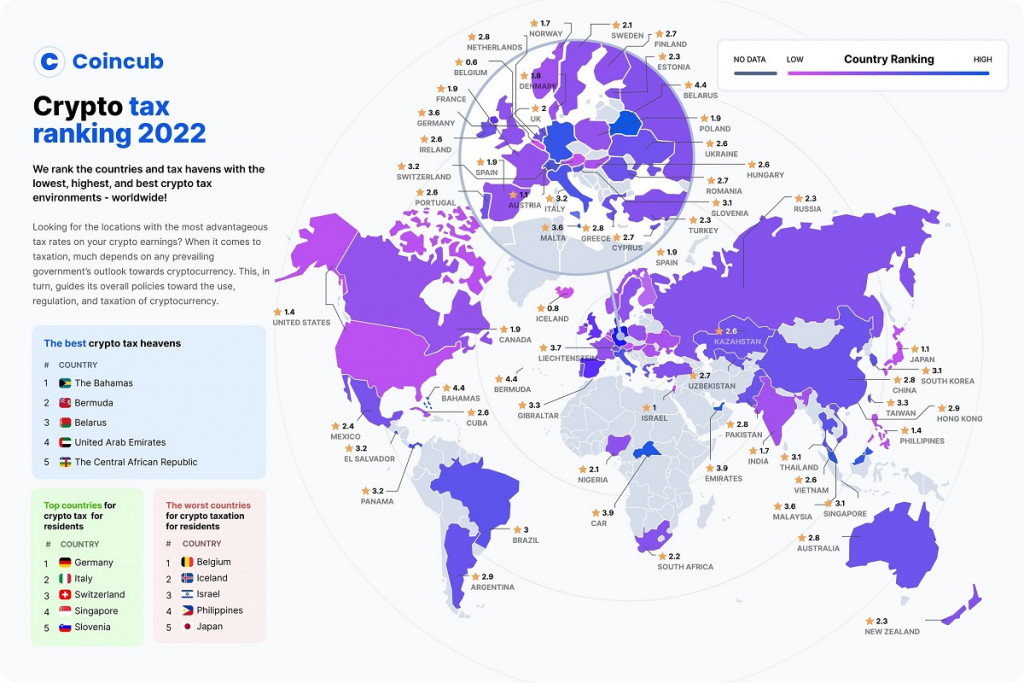Coincub teams with crypto tax specialists, ACCOINTING, for crypto tax ranking
The demands and expectations of cryptocurrency are always changing, and governments are continually adapting their taxation strategy accordingly. Crypto tax specialist, Accointing, sees an ever-increasing demand for crypto investing and is right behind Coincub’s effort to provide ever greater clarity on the worldwide crypto industry.
One of the consistent findings of Coincub’s quarterly rankings of the world’s leading crypto economies is that many countries are still evolving the regulatory requirements asked of their citizens who invest in crypto assets. Crypto gains can fall into a multitude of reporting requirements and each country has its own tax rules. In some countries, crypto gains form part of standard income tax reporting requirements in others they require special treatment subject to additional criteria.
Germany – a mainstream economy with generous crypto tax concessions
In the ranking of traditional ‘tax-based’ economies, Germany tops the list as the best place for cryptocurrency investors – anyone holding their cryptocurrency for a minimum of a year will incur no capital gains tax on the sale or conversion of their crypto.
Germany best mainstream economy for long-term crypto investors
This tax-efficient incentive rewards its own citizens and not just non-doms and overseas investors as is the norm in classic tax havens. Following on the top five mainstream economies that have the most favorable tax policies for their citizens are Italy, Switzerland, Singapore, and Slovenia.
Countries with the highest tax demand
Coincub’s ranking also points up those locations less favorable to crypto investors (these countries show the highest minus scores on the full ranking list).
Belgium heads the top five countries for the least accommodating taxation policies toward crypto with gains incurring 33% tax, plus progressive taxation rates up to 50% for professional traders. Bringing up the next four places in the top five are Iceland, Israel, The Philippines, and Japan all with higher than average income tax on crypto gains.
Belgium worst mainstream economy for crypto income taxation
Nb – we make a point about India, which lies at number six, as the country has recently imposed a highly contentious (at least to crypto investors) crypto transaction tax of 1% on crypto transactions exceeding 50,000 INR (approx $600) in a financial year – a pretty low threshold for regular investors.
There is also a flat rate tax of 30% on all profits or income from cryptocurrency to boot. Many countries, The Philippines among them, are watching to see if this stifles the cryptocurrency industry.
Bahamas, Bermuda, and Belarus top list of crypto havens
Tax havens still going strong
In terms of classic tax havens, as opposed to traditional ‘tax-based’ economies, we see the usual suspects emerging. In the top five tax havens worldwide where tax concessions are generously applied to overseas investors, crypto is no exception. Heading our top three – with not much to choose between them – are The Bahamas, Bermuda, and Belarus. At number four is the United Arab Emirates with zero tax across the country’s so-called ‘free zones’. A newcomer to this ranking is The Central African Republic which recently classified bitcoin as a legal tender and that also has big plans to promote itself as a crypto hot spot with very favorable tax concessions on crypto gains to overseas investors as a means of boosting its economy.
The evolution of crypto tax laws
Perversely, tax laws are clearer and more defined in noted tax havens that cater predominately to specialist overseas investors. In traditional ‘tax-based’ economies, the result can often be a lack of understanding amongst casual or even professional investors uncertain or perhaps negligent of their tax position.
The first step, for ACCOINTING.com, is to help demystify this apparent confusion, especially with the demand for crypto tax planning set to grow as crypto assets increasingly form part of mainstream investing options.
According to ACCOINTING Marketing Director, Rodrigo Mayen:
“Our focus centers in Europe and North America where crypto tax regulations and adoption are already in place. However, there’s still a lack of guidance on addressing more complex topics like NFTs, staking, and the Metaverse. Transactions such as swapping, lending and borrowing, yield farming, and other transactions in the DeFi space are some of the issues to be navigated. We can’t all live in Lichtenstein .”
Coincub has been issuing quarterly rankings based on a wide set of criteria for some years and now is one of the leading crypto ranking sites. Taxation is just one of its ranking categories, but one of its most important.
See the full crypto taxation ranking HERE
